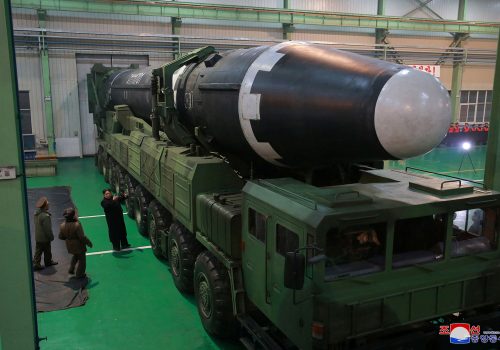FAST THINKING: What we’re watching in North Korea
GET UP TO SPEED
Four years ago, Barack Obama warned Donald Trump that North Korea would pose the president-elect’s most urgent challenge. Ever since, despite all his summits with Trump, Kim Jong Un has pressed forward with developing a nuclear-weapons arsenal that could directly threaten the United States. And in recent days, as Americans were preoccupied with the violence at the US Capitol, top officials in Pyongyang held a rare party congress to articulate their national-security strategy. Markus Garlauskas, who in June departed his post as America’s top intelligence officer for North Korea analysis, has been assessing the readouts from the congress. (Since his time in the intelligence community ended so recently, we should note that his views don’t imply the endorsement of the US government.) Let’s dive into his analysis.
TODAY’S EXPERT REACTION COURTESY OF
- Markus Garlauskas (@Mister_G_2): Former National Intelligence Officer for North Korea and senior fellow at the Scowcroft Center’s Asia Security Initiative
Why the Party Congress matters
- These are infrequent events, Markus tells us, held by the ruling Workers’ Party of Korea over several days. (This was only the eighth such congress in the country’s seventy-year history and the second in Kim Jong Un’s lifetime.) They include “thousands of representatives from all major parts of North Korea and its government, state enterprises, and military,” he notes, “who meet to refine, codify, and formalize the party’s leadership structure, priorities, and policies on top issues.”
- This time, he adds, North Korea’s leader seems to be using the congress in part to send a message to the incoming US president. Kim may “have chosen to hold the congress before Joe Biden takes office—rather than in May, like the last one—to demonstrate to the incoming Biden administration the North Korean ruling elite’s commitment to a set of policies.”
Reading the signals from Pyongyang
- So what did Kim signal to Biden? Markus notes that his opening speech both admitted the failure of the party’s five-year economic plan and avoided mention of the country’s nuclear-weapons and missile programs, prompting optimism from some observers that Kim may be chastened or even desperate. But he calls these hopes “ill-advised,” noting that similar Kim speeches have in the past been followed by raw displays of military or nuclear power.
- In fact, he adds, there’s reason for the Biden team to be concerned. “A few days into the congress, instead of detonating a literal nuclear bomb as he did in January 2016, Kim Jong Un dropped a figurative one,” Markus tells us. “He shifted his attention to the United States, to quash any optimism that there would be a change in policy from Washington just because of the change in administration, referring to the United States as North Korea’s ‘archenemy.’ Though he expressed an openness to diplomacy, Kim was clear that this would have to be on Pyongyang’s terms, noting that North Korea must ‘bend the United States to its will.’”
- Well, that doesn’t sound good. But there’s more. “Kim followed this with a declaration that North Korea would continue to push forward with its nuclear-weapons program unabated, underscored by Pyongyang’s most detailed official laydown ever of past accomplishments and future plans for its nuclear and missile programs,” Markus explains.
Where does this leave the Biden team?
- The congress, Markus says, serves as compelling evidence of Kim’s commitment “to maintaining a nuclear-weapons program and avoiding fundamental economic reforms. It may be painful to admit, but it is long past time for Washington to abandon the assumption that it can force Kim Jong Un to make a strategic choice to give up his nuclear and missile programs in exchange for economic benefits.”
- What should the US government do instead? “The logical alternative is to adopt a fundamentally new and pragmatic strategy to counter North Korea’s growing nuclear and missile capabilities, including a focus on slowing—ideally halting—the improvement of these capabilities,” Markus says. “The immediate priority for US policy on North Korea should therefore be on preventing renewed ballistic-missile testing” by combining “tangible incentives for not testing with a more credible prospect of meaningful punishment for resuming testing.”
- He adds: “Ideally, this approach could enable negotiation of a formal North Korean moratorium on nuclear and missile testing, though even causing Kim to delay and hesitate would be worth the effort.”
- “Preventing any testing at all for even a few years” would keep North Korea during that period from perfecting the weapons it tested over the last five years and advancing its “wish list” of new weapons beyond “unproven prototypes,” Markus notes. That, he says, “would be a difficult but truly meaningful achievement.”
Further reading
Mon, Jan 4, 2021
FAST THINKING: What’s Iran thinking?
Fast Thinking By
Tehran seized a South Korean tanker while also announcing that it had begun increasing its uranium enrichment levels to 20 percent. Why?
Thu, Oct 1, 2020
What an ‘October surprise’ from North Korea might actually look like
New Atlanticist By
If Kim offers up an “October surprise” this year, it probably won’t be the North Korean version of the fictional Soviet ballistic-missile submarine “Red October.” Instead, it may well come in the form of new missiles displayed on the streets of Pyongyang during the Party’s 75th anniversary parade.
Thu, Apr 30, 2020
Loose cobras: DPRK regime succession and uncertain control over offensive cyber capabilities
Conflict, Risk, and Tech By JD Work
Unconfirmed rumors surfaced in mid April 2020 regarding the potential incapacitation of North Korean leader Kim Jong Un, leading to speculation about the ramifications of a sudden transition of leadership in Pyongyang. These rumors raise serious concerns over the stability of the Democratic People’s Republic of Korea’s (DPRK) control of offensive cyber operations capabilities.
Image: In his closing speech, Kim called for the strengthening of the country's nuclear capabilities, via Reuters


